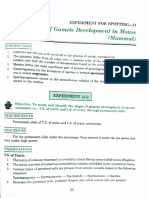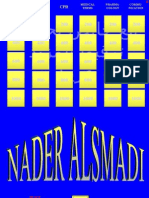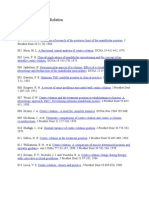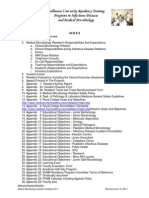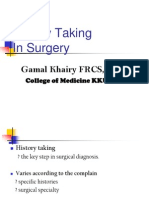Anatomy Notes Leydig
Anatomy Notes Leydig
Uploaded by
jed guicoCopyright:
Available Formats
Anatomy Notes Leydig
Anatomy Notes Leydig
Uploaded by
jed guicoOriginal Description:
Original Title
Copyright
Available Formats
Share this document
Did you find this document useful?
Is this content inappropriate?
Copyright:
Available Formats
Anatomy Notes Leydig
Anatomy Notes Leydig
Uploaded by
jed guicoCopyright:
Available Formats
LEYDIG CELLS SERTOLI CELLS
Most functional cells in the interstitium o Basically columnar resting upon the basal lamina
Synthesize and secrete male sex steroids called and extending upward through the full thickness of
androgens the epithelium to its free surface
Testosterone – most abundant androgen released o Thin processes radiate laterally to surround the
by Leydig cells spermatogenic cells and occupy the interstices
Exist in small clusters of cells among them
15-20 um in diameter o Nucleus is ovoid about 9 x 12 um and has large
Central round nucleus with peripheral nucleolus
heterochromatin and one or more prominent o Cytoplasm:
nucleoli numerous slender mitochondria often oriented
Cytoplasm: parallel along the long axis of the cell
- well-developed Golgi Apparatus close to the lipid droplets
nucleus which helps elaborate an abundance occasional lipofuscin pigment granules
of SER, which contains the enzymes for sparse RER
testosterone synthesis well-developed SER (for secretion and
- also contains lysosomes, peroxisomes, and modification of steroid hormones)
conspicuous crystals of Reinke; function is
unknown Crystalloids of Charcot-Bottcher
- inclusions peculiar to human sertoli cells
Interstitial tissue contains numerous small - slender, fusiform structures10 to 25 um long
lymphatic vessels and abundant interstitial fluid
The testosterone produced by the leydig cells
enters the interstitial fluid Functions:
Androgens enter the systemic circulation through trophic function in spermatogenesis
the interstitial fenestrated capillaries near leydig Help phagocytose and destroy cells that die during
cells spermatogenesis and residual bodies shed by
spermatids during spermiogenesis
Secrete fluids that create a hospitable environment
for spermatozoa in the seminiferous tubules
FSH and testosterone stimulate sertoli cells to
secrete androgen binding protein
very high concentrations of testosterone are
required to support the spermatogenic cycle of
the seminiferous epithelium
Androgen binding protein concentrates
tstosterone in the microenvironment of the
semiferous epthelium
Sertoli cells also secrete the protein inhibin, which
provides feedback that helps inhibit FSH production
by adenohypophysial gonadotropes either by directly
affecting the hormone producing gonadotropes or
by affecting the secretion of hypothalamic GnRH
You might also like
- The Forever Fix Gene Therapy and The Boy Who Saved ItDocument12 pagesThe Forever Fix Gene Therapy and The Boy Who Saved ItMacmillan PublishersNo ratings yet
- V2017071 SCRIPT STANDARD - Example - GuideDocument599 pagesV2017071 SCRIPT STANDARD - Example - GuideNileima Elaine Romero100% (1)
- Biology Investigatory Project On GametogenesisDocument20 pagesBiology Investigatory Project On GametogenesisAshwin Rockzz53% (15)
- Suicide Risk Assessment Form: (Adapted From Becks Suicidal Intent Scale)Document2 pagesSuicide Risk Assessment Form: (Adapted From Becks Suicidal Intent Scale)nora_annisaNo ratings yet
- 61 Sharma and Agarwal Spermiogenesis - An OverviewDocument26 pages61 Sharma and Agarwal Spermiogenesis - An Overviewjohairah merphaNo ratings yet
- Male Reproductive SystemDocument35 pagesMale Reproductive Systemrenaeljoy27No ratings yet
- Spermatogenesis: An Overview: Rakesh Sharma and Ashok AgarwalDocument25 pagesSpermatogenesis: An Overview: Rakesh Sharma and Ashok Agarwalumar umarNo ratings yet
- G.R. Pitts, J.R. Schiller, and James F. Thompson, PH.DDocument92 pagesG.R. Pitts, J.R. Schiller, and James F. Thompson, PH.DJonalynCollodChewacheoNo ratings yet
- The Human Reproductive SystemDocument7 pagesThe Human Reproductive SystemAlloiza CaguiclaNo ratings yet
- Chapter 21 The Male Reproductive SystemDocument6 pagesChapter 21 The Male Reproductive SystemEllä Pabustan100% (1)
- Kfo181 Maennl GoDocument18 pagesKfo181 Maennl Gosong lyrics-sing your ownNo ratings yet
- Spermatogenesis - Biology Science Fair Project IdeasDocument8 pagesSpermatogenesis - Biology Science Fair Project IdeasEPFO AKURDI100% (1)
- Siklus Sel 2fDocument27 pagesSiklus Sel 2fNishfullaili Nurun NisaNo ratings yet
- 10.1a Sexual Reproduction in HumanDocument31 pages10.1a Sexual Reproduction in HumanKA YAN YAPNo ratings yet
- Male Reproductive PhysiologyDocument83 pagesMale Reproductive PhysiologyX Christian CatalanNo ratings yet
- Week 7 Semenalysis (Lecture)Document6 pagesWeek 7 Semenalysis (Lecture)Dayledaniel SorvetoNo ratings yet
- Reproductive SystemDocument7 pagesReproductive Systemsairakhan215asNo ratings yet
- Reproductive System2Document33 pagesReproductive System2ammarNo ratings yet
- Regeneration in AxolotlDocument13 pagesRegeneration in AxolotlȺនђᎥនђ ツᦔøץNo ratings yet
- Male Reproductive SystemDocument14 pagesMale Reproductive SystemwakhidaamaliaNo ratings yet
- 2B Dev BioDocument63 pages2B Dev BioYashNo ratings yet
- Histology EndocrineDocument5 pagesHistology EndocrineIsaac DoringoNo ratings yet
- Male ReproductivehistoDocument9 pagesMale ReproductivehistoaikaNo ratings yet
- Malereproductive SystemDocument8 pagesMalereproductive SystemJM FloresNo ratings yet
- Male Reproductive SystemDocument62 pagesMale Reproductive SystemSalman KhanNo ratings yet
- G.R. Pitts, J.R. Schiller, and James F. Thompson, PH.DDocument91 pagesG.R. Pitts, J.R. Schiller, and James F. Thompson, PH.DrerenNo ratings yet
- BioDocument7 pagesBiomprakalathan14No ratings yet
- ln1bhms 4629 PhysofmaleDocument19 pagesln1bhms 4629 Physofmaleerlanristianto1898octoNo ratings yet
- LECTURE 6 Male Reproductive System - Histology HB II 2023Document76 pagesLECTURE 6 Male Reproductive System - Histology HB II 2023Emmanuel AssopiahNo ratings yet
- 24 Male Reproduction NXPowerLiteDocument141 pages24 Male Reproduction NXPowerLiteEarn cruzNo ratings yet
- MRS LabDocument6 pagesMRS Lab2012000600No ratings yet
- L25 PDFDocument46 pagesL25 PDFMiles HuiNo ratings yet
- Reproduction Student MaterialDocument27 pagesReproduction Student MaterialEsosa OdighizuwaNo ratings yet
- Developmental Biology: GametogenesisDocument21 pagesDevelopmental Biology: GametogenesisTapan Kumar PalNo ratings yet
- Biology 12 Worksheet Male Reproductive SystemDocument4 pagesBiology 12 Worksheet Male Reproductive SystemMJ VergaraNo ratings yet
- Lecture Notes Module - 3 - Male Reproductive Anatomy and PhysiologyDocument8 pagesLecture Notes Module - 3 - Male Reproductive Anatomy and PhysiologyMariaImranNo ratings yet
- Ilide - Info Class 12 Bio Project Spermatogenesis PRDocument19 pagesIlide - Info Class 12 Bio Project Spermatogenesis PRlaibanisarkhan194No ratings yet
- The Male Reproductive SystemDocument76 pagesThe Male Reproductive SystemteklayNo ratings yet
- Male Histology Trans-Batch 2023Document11 pagesMale Histology Trans-Batch 2023Hanako Sasaki AranillaNo ratings yet
- Week 2 Supplementary Activity 1 - Parts and Function Reproductive SystemDocument4 pagesWeek 2 Supplementary Activity 1 - Parts and Function Reproductive SystemBernadette Vidon-PangilinanNo ratings yet
- Bio Exp 1 & 2Document5 pagesBio Exp 1 & 2Rittik Ranjan Prasad XII B67% (3)
- SpermatogenesisDocument13 pagesSpermatogenesiszuha khanNo ratings yet
- Male Reproductive SytemDocument4 pagesMale Reproductive SytemSheena Liegh EntredichoNo ratings yet
- HematologyDocument23 pagesHematologyWynlor AbarcaNo ratings yet
- Male Reproduction Anat and PhysioDocument36 pagesMale Reproduction Anat and PhysioDeny ShajiniNo ratings yet
- Spermatogenesis: Grasshopper TestisDocument5 pagesSpermatogenesis: Grasshopper TestisMarina of The SeaNo ratings yet
- Demo File of Biology Revision Package For NEETDocument19 pagesDemo File of Biology Revision Package For NEETHarsh YadavNo ratings yet
- Tissue Cell Type and Stage Specific Ectopic Gene Expression and RNAi Induction in The Drosophila TestisDocument13 pagesTissue Cell Type and Stage Specific Ectopic Gene Expression and RNAi Induction in The Drosophila Testisaaki2627No ratings yet
- Sertoli Cell Cell Testes Germ Cells SertoliDocument3 pagesSertoli Cell Cell Testes Germ Cells Sertolihur-azmi-1154No ratings yet
- Endocrine System TransDocument21 pagesEndocrine System TransMa. Mil Adrianne PamaNo ratings yet
- Cell STRUCTURE and Function Worksheet. HomeworkDocument5 pagesCell STRUCTURE and Function Worksheet. HomeworkMichael WrightNo ratings yet
- Human Reproduction - L2Document28 pagesHuman Reproduction - L2israrmarwat6100No ratings yet
- Histology of The Male Reproductive SystemDocument18 pagesHistology of The Male Reproductive SystemMuhammad JameelNo ratings yet
- Spermatogenesis Group 4Document20 pagesSpermatogenesis Group 4sugarxglossNo ratings yet
- Hormonal ControlDocument7 pagesHormonal Controltapasdebbarma0907No ratings yet
- Male Reproductive System: Primary Sex Organ Secondary Sex OrganDocument8 pagesMale Reproductive System: Primary Sex Organ Secondary Sex OrganPranoy MayuriNo ratings yet
- Scrapy Group 3Document7 pagesScrapy Group 3Andrea Ericka CanawayNo ratings yet
- Sajad 2020Document22 pagesSajad 2020MD LarasatiNo ratings yet
- Reproductive SystemDocument5 pagesReproductive Systemmuli.michaelNo ratings yet
- Male Reproductive Gland FinDocument16 pagesMale Reproductive Gland FinrosalesjirehrNo ratings yet
- SpermatogenesisDocument16 pagesSpermatogenesisFazilaNo ratings yet
- The Organs of The Male Reproductive System Are Specialized For The Following FunctionsDocument3 pagesThe Organs of The Male Reproductive System Are Specialized For The Following FunctionsGabrielaNo ratings yet
- Navigating Testicular Dysfunction: Insights, Detection, and Holistic ManagementFrom EverandNavigating Testicular Dysfunction: Insights, Detection, and Holistic ManagementNo ratings yet
- Jeffrey Isaacs v. Dartmouth CollegeDocument58 pagesJeffrey Isaacs v. Dartmouth CollegeJeffreyIsaacsNo ratings yet
- Find Your Match According To Your Date of Birth and The Number You RepresentDocument7 pagesFind Your Match According To Your Date of Birth and The Number You RepresentImam ShakilNo ratings yet
- Permintaan Reagen PertahunperbulanDocument3 pagesPermintaan Reagen PertahunperbulanAde Oktaviana Ny SyihabNo ratings yet
- Nursing Level I & II Quick AnswersDocument62 pagesNursing Level I & II Quick AnswersNader Smadi80% (5)
- Section 010 Centric RelationDocument21 pagesSection 010 Centric RelationSummer Flowers100% (1)
- Practice Questions - Behavioral ScienceDocument4 pagesPractice Questions - Behavioral Sciencebakwet100% (1)
- ANTIFUNGALSDocument12 pagesANTIFUNGALSSofiaRodriguezNo ratings yet
- Mushoku 1tensei 19 - Young Man Period - Subordinates Chapter1Document277 pagesMushoku 1tensei 19 - Young Man Period - Subordinates Chapter1Murilo HenriqueNo ratings yet
- CHAPTER IV (Autosaved) EditDocument122 pagesCHAPTER IV (Autosaved) Editheppi niceNo ratings yet
- 50 First DatesDocument3 pages50 First DatesEmman Jemuel Ramsey VelosNo ratings yet
- Appendix II Staged Senior Professional and Technical Examinations For Medical Doctors, Dentists, TCM Practitioners, and Pharmacists-Exam SubjectsDocument2 pagesAppendix II Staged Senior Professional and Technical Examinations For Medical Doctors, Dentists, TCM Practitioners, and Pharmacists-Exam SubjectsSalma MentariNo ratings yet
- INTRODUCTION HerbariumDocument22 pagesINTRODUCTION HerbariumDanish DhimanNo ratings yet
- 4 - Guidelines On Weight-Adjusted Dosing ParacetamolDocument1 page4 - Guidelines On Weight-Adjusted Dosing ParacetamolramonacriveiNo ratings yet
- Triage NurseDocument1 pageTriage NurseJeyser T. GamutiaNo ratings yet
- Medical Microbiology Resident's HandbookDocument191 pagesMedical Microbiology Resident's HandbookSrinivas RajanalaNo ratings yet
- Mutia Sukma Dewi 2010.04.0.0142 (Jurnal) PDFDocument12 pagesMutia Sukma Dewi 2010.04.0.0142 (Jurnal) PDFmutiaNo ratings yet
- Fillable Breast Cancer Survivorship Plan v3 102009Document2 pagesFillable Breast Cancer Survivorship Plan v3 102009api-270501725No ratings yet
- HealthMed Vol03-No1Document96 pagesHealthMed Vol03-No1Goran MartinovićNo ratings yet
- Resume of SamellaabdullahDocument2 pagesResume of Samellaabdullahapi-25444894No ratings yet
- Journal ListDocument127 pagesJournal ListJaimin K PatelNo ratings yet
- Emerging OpportunitiesDocument23 pagesEmerging OpportunitiesFloriejane Marata100% (2)
- UMC Business PlanDocument37 pagesUMC Business Planiyad.alsabiNo ratings yet
- The Assessment of Social Adjustment: A Review of Techniques: Archives of General Psychiatry April 1975Document10 pagesThe Assessment of Social Adjustment: A Review of Techniques: Archives of General Psychiatry April 1975Anonymous 8HCovBzERDNo ratings yet
- STI Public Health Lecture 2019Document100 pagesSTI Public Health Lecture 2019Estrella M. Ramirez-Lawas100% (1)
- Skin-Disease-Classification - Using Deep Neural NetworksDocument5 pagesSkin-Disease-Classification - Using Deep Neural NetworksFunZoa LifeNo ratings yet
- History Taking in Surgery 123Document25 pagesHistory Taking in Surgery 123tahreem_saeed_1No ratings yet
- Energy DrinksDocument3 pagesEnergy DrinksevarismartNo ratings yet








































